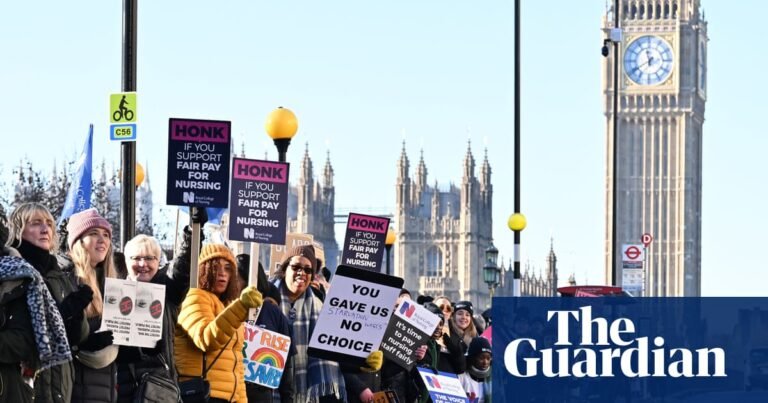Nine out of 10 nurses have rejected a 3.6% pay award for this year and warned they could strike later this year unless their salaries are improved.
In an indicative vote among members of the Royal College of Nursing (RCN) in England, Wales and Northern Ireland, 91% said the 3.6% rise was not enough.
The union has told ministers to “use the summer to reach agreement on investment in the nursing workforce or face formal escalation to a dispute and an industrial action ballot”.
Nurses’ overwhelming rejection of their pay award is a new NHS industrial relations headache for ministers in London, Cardiff and Belfast, especially Wes Streeting, the health secretary, who is already trying to resolve strikes by resident doctors in England seeking a 29% pay rise.
With other unions representing staff across the UK voicing increasing disquiet over pay, and resident doctors threatening to strike until January, it could result in the NHS in different parts of Britain being hit by an autumn or winter of disruption.
The RCN said: “In the largest consultation ever conducted by the RCN 91% said the NHS staff pay award of 3.6% was not enough to turn around a profession gripped by widespread vacancies, years of pay erosion and thwarted career progression.”
Turnout was 56% and more than 170,000 RCN members in England voted, the union said. It did not provide exact turnout numbers or a breakdown of the voting across the three countries.
Prof Nicola Ranger, the RCN’s general secretary and chief executive, said: “We deliver the vast majority of care in every [NHS] service and deserve to be valued for all our skill, knowledge and experience. To avoid formal escalation, the government must be true to its word and negotiate on reforms of the outdated pay structure which traps nursing staff at the same band their entire career.”
Nurses in England staged several stoppages in late 2022 and early 2023 in pursuit of better pay.
The RCN also wants Agenda for Change, the UK-wide mechanism for negotiating the pay of NHS staff apart from doctors and dentists, to be updated. The longstanding agreement “provides nurses with low starting salaries, traps tens of thousands of nurses on the same pay band their entire careers and prevents staff progressing, despite years of experience, skills, formal qualifications and training”, it said.
NHS bosses said patients would suffer if nurses did end up striking again. “NHS leaders will be disappointed to hear of the threat of further walkouts given the dust has barely settled on the five-day resident doctor strike,” said Rory Deighton, the acute and community care director at the NHS Confederation. “Patients are always the ones who end up suffering the most during industrial action as they are left waiting longer for their vital treatments, potentially in pain, discomfort and distress.”
skip past newsletter promotion
Our morning email breaks down the key stories of the day, telling you what’s happening and why it matters
Privacy Notice: Newsletters may contain info about charities, online ads, and content funded by outside parties. For more information see our Privacy Policy. We use Google reCaptcha to protect our website and the Google Privacy Policy and Terms of Service apply.
after newsletter promotion
Public opinion is split on the prospect of a renewed campaign of action by nurses. In polling by YouGov this week, 47% said they strongly or somewhat supported nurses going on strike over pay, while 43% said they would strongly or somewhat oppose that.
The Department of Health and Social Care said it was disappointed nurses in England had rejected the 3.6% award that Streeting had announced in May. “After receiving two above-inflation pay rises from this government, new full-time nurses will earn £30,000 in basic pay for the first time this year so it’s disappointing that RCN members are dissatisfied with this year’s pay rise,” a DHSC spokesperson said.
“We hugely value the work of nurses, and through our 10-year health plan, we are rebuilding the NHS for the benefit of patients and staff, and ensuring nursing remains an attractive career choice. This government is clear we can’t move any further on headline pay but will work with the RCN to improve their major concerns, including pay structure reform, concerns on career progression and wider working conditions.”
